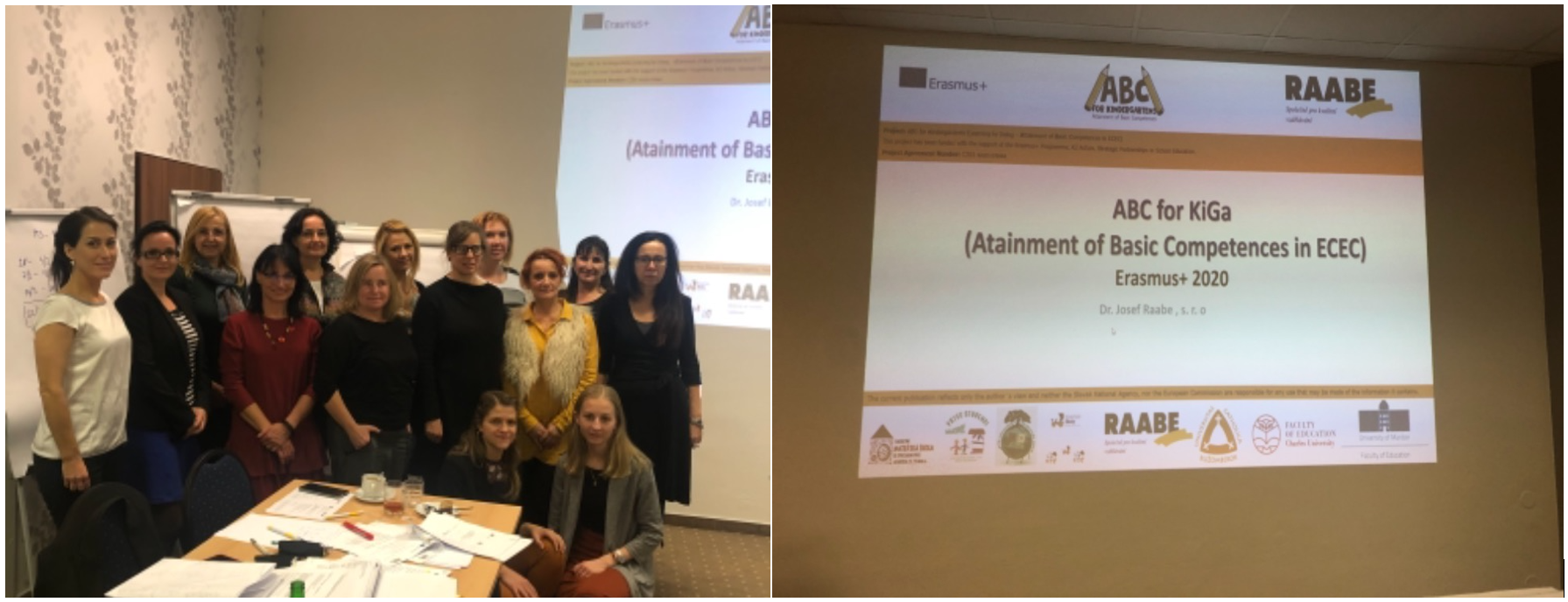Dear readers,
We are sending you the third newsletter dedicated to the international project “Learning by Doing – Development of Key Competences in Preschool Education (ABC for Kindergartens)”. The project was started by Dr. Josef Raabe, s.r.o. in November 2020 together with eight other partners from three European countries – Slovakia, the Czech Republic and Slovenia.
We would like to share with you information about the progress of our project, about the tasks we have successfully completed and the goals that still lie ahead.
We believe that together with you we can achieve our goal – to support teachers in preschool education and teacher training in the application of project and activity learning.
This project has been funded with support from the Erasmus + program, project number: 2020 -1-CZ01-KA201-078464, Key Action 2, Strategic Partnerships in School Education.
This publication (document) represents the exclusive opinion of the author. Neither the SAAIC National Agency – Erasmus + nor the European Commission are responsible for any use that may be made of the information contained therein.
What we worked on
During the period from June to November 2021, we were actively involved in the implementation of the following activities:
– Creating the first intellectual output of the project, namely writing and completing the ABC Manual for Teachers.
– Designing the second intellectual output of the project: ABC Train the Trainer Course.
– Planning and cunducting of a meeting in Prague.
We are very pleased to report that all these goals have been achieved.
The ABC Manual for Teachers
The project aims to develop a methodological guidance for ECEC teachers on how to integrate PBL and TBL into pre-school education, with practical activities and a comprehensive overview of lesson plans, assessment techniques and various additional resources.
The main task in the last period was the preparation of the ABC Manual for Teachers. The project participants from the universities did a very good job and wrote a ABC Manual for Teachers which consists of 3 parts. The introductory part is devoted to the role of the child and the role of the teacher in preschool education. It introduces the changing nature of these roles and explains the principles on which preschool education, readiness to learn and regularity of learning of a preschool child should be based. In addition, the introductory section presents the role of the educator and professional development opportunities for teachers.
The theoretical introduction is followed by a comprehensive section on task-based learning and project-based learning. The theoretical background and definitions of the two didactic strategies are presented, as well as their advantages and challenges, the role of the teacher, the role of the children, and the role of the kindergarten are highlighted. In addition, the possibilities of using the task-based approach in different areas of preschool education are presented with concrete examples of its use in kindergarten.
The ABC manual for teachers is therefore ready for evaluation. Examples of task- and project-based learning activities included in the ABC Manual for Teachers will be verificated in kindergartens from December through March.
Designing ABC Train the Trainer Course (O2)
ABC Train the Trainer Course is going to be a training programme for ECEC teacher training providers on how to train students in pedagogy and teachers willing to enhance their professional development with focus on learner-centred methods such as on PBL and TBL.
So far, the structure of the Train the trainers course has been discussed and designed. The Train the Trainers Course will be designed as an online course and the planned structure includes 4 sets of 2 hours each, for a total of 8 hours of online learning. All prepared materials for the course will be freely available on the website. The sets included in the course are as follows:
Lot 1 – Theoretical Starting Points of Preschool Education.
Lot 2 – Task-based learning
Lot 3 – Project based learning
Lot 4 – Practical part or implementation of task-based and project-based learning.
Project meeting in Prague
The project meeting took place in Prague on 8 and 9 November and was attended by representatives of all project partner organisations. Considering the fact that all previous project meetings were held online due to the covid epidemic, we are very glad that this time we were able to meet in person. The project meeting was attended by 14 participants who first met informally over dinner on Monday evening. This was followed the next day by an extremely productive meeting that began with an overview of the completed project tasks and continued with planning the next steps to achieve the project goals. The main points of the meeting were to plan the piloting in kindergartens to evaluate the ABC Manual for teachers and to determine the design of the Train the Trainers online course. Information was also provided on the external report and internal evaluation and the dates for the next two meetings were agreed. The 3rd meeting is planned to take place in Ružembork in April 2022, while the 4th meeting will be held in Prague together with the conference in November 2022.

What’s coming up
In the near future we will work intensively on the evaluation of the theoretical and practical part of the ABC Manual for teachers, in which the participating kindergartens will play an important role.
The next task is to prepare the content of the online course Train the trainers and plan its evaluation.
In addition, we will prepare the next partner meeting of the project participants. It is planned for April 2022 in Ruzomberok and we hope that all partners will be able to meet again in person – representatives of Charles University in Prague, Catholic University in Ružomberok, University of Maribor, Faculty Kindergarten with special care in Prague, Kindergartens Kopřivnice, Kindergartens in Ružomberok and Kindergarten Vrtec Studenci in Maribor.
Word in conclusion
We are pleased that the project is attracting interest from both in-service and pre-service preschool teachers. We believe that the project has great potential to support and strengthen the development of key competencies for all in early childhood by helping to change teachers’ perspectives on preschool education and promoting learner-centred approaches.


